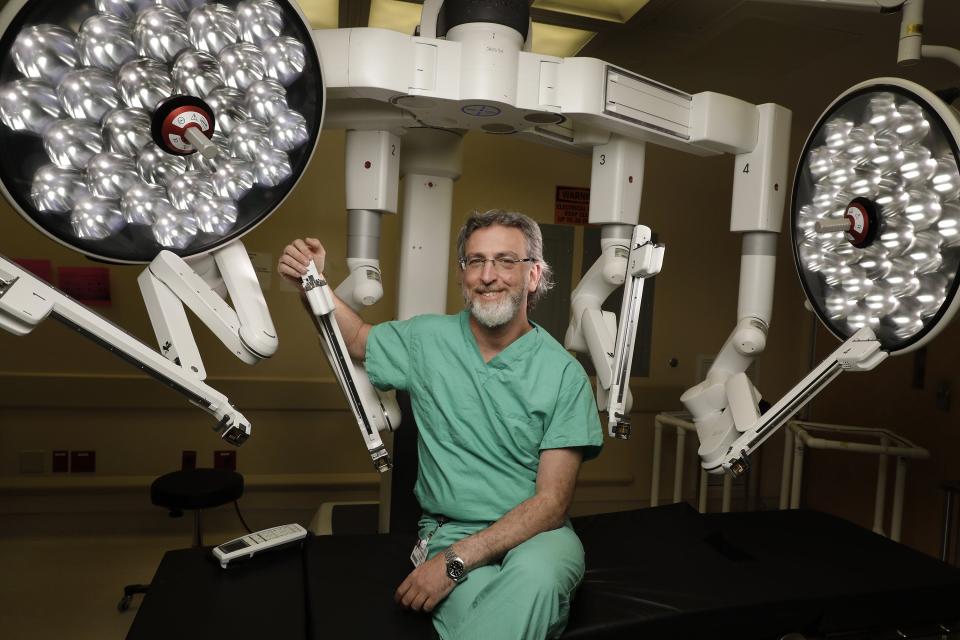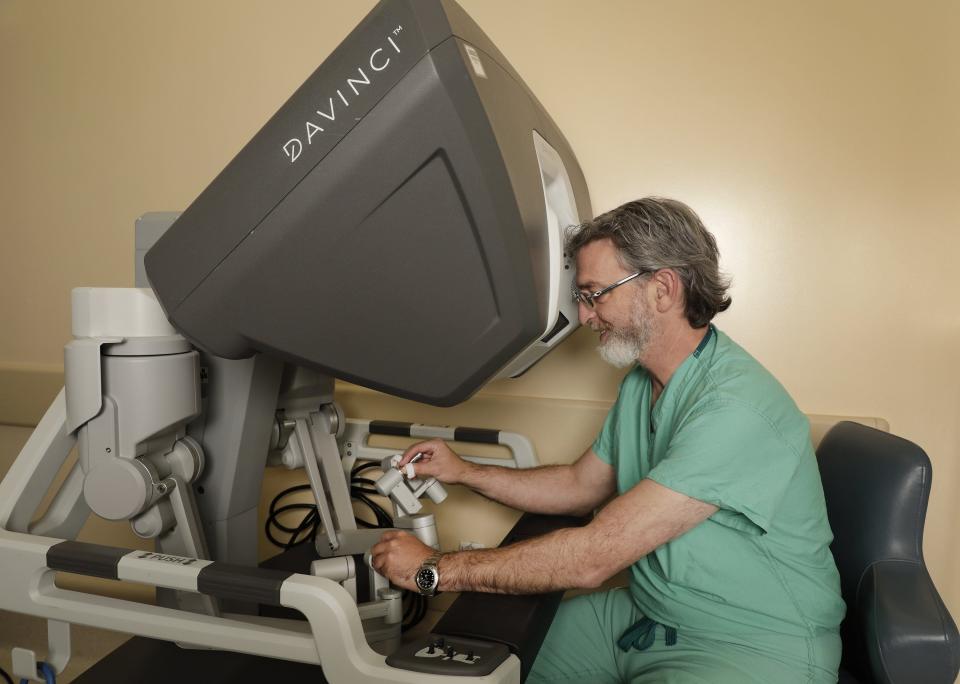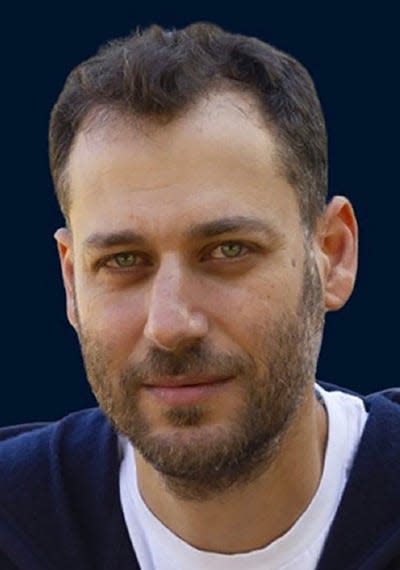As screening ages change, Jacksonville cancer center eyes AI to record colorectal surgery
Baptist MD Anderson Cancer Center in Jacksonville is evaluating using artificial intelligence-based technology in hopes of improving the survival rate and recovery times of colon and rectal surgery patients.
The Theator Surgical Intelligence Platform is a new software that records every move a surgeon makes in the operating room, according to Dr. Ron Landmann, the colon and rectal surgeon who heads the hospital's colorectal surgery division.
That advance, in addition to the use of AI-based robots to assist in surgery, could "bring about a substantial improvement in quality, safety, outcomes and general improvement in patients' lives," he said.
"I'm so passionate about this technology," Landmann said. "To date, we have never really been able to see, measure and quantify what is actually happening within our operating rooms."

The technology, developed by an Israeli-based company called Theator, is computer-vision software that does not require cameras or sensors. It "provides opportunities to act and improve what we do — and this translates into better outcome," he said. "It is truly extraordinary and something that our general population needs to be educated about."
Mayo Clinic in Jacksonville has also been evaluating the platform and plans to begin using it in clinical practice, including surgery, later this month, according to a spokeswoman.
New guidelines for screenings, now younger than 50
Landmann said the general population also needs to be educated about colorectal cancer, which is the third-most common cancer in men and women in the United States and is on the rise among people younger than 50. The Centers for Disease Control and Prevention now recommends colorectal screenings every 10 years for men and women who are 45 years old or older, lowered from the previous recommendation of age 50 because of the rise in cases among younger people.
Anyone who is high risk — such as people who have inflammatory bowel diseases such as ulcerative colitis and Crohn's disease or a history of colorectal cancer in a parent, sibling or child — should get annual screening tests.
A recent American Cancer Society study found that about one-third of U.S. adults are overdue for colorectal screenings, even though they "can prevent the disease and detect it at early stages when the prognosis is most favorable," said Dr. Jordan Baeker Bispo, the society's principal scientist in cancer disparity research.
"These findings are alarming as they highlight a major communication gap about CRC prevention in the clinical setting," Bispo, lead author of the study, said.
What's all the buzz about AI? Here's what we know for Jacksonville health care
About 73.2% of those adults who were overdue also reported that their clinician did not recommend a screening during a wellness visit in the past year. "We’re missing one of the best opportunities, while visiting the doctor, to remind adults to get screened for this potentially deadly disease," Bispo said.
Jennifer Ryan is CEO of Volunteers in Medicine, which provides free health care to low-income, uninsured working adults and their families. She was so concerned about the lack of screenings that she submitted a guest column to the Times-Union last year.
"Screening is an important part of the primary care visit," she said. "So many people were not getting the necessary screenings they needed and this is one of those cancers that if caught early can save lives."
The nonprofit provides free test kits to patients who are not at risk for colon cancer and only 4 of 50 in the last 12 months came back positive, she said. Those few patients were referred elsewhere for colonoscopies.
Despite a "significant uptick" in colorectal diagnoses among people younger than 50, Landmann said case rates are declining for people age 50 to 70, he said. He attributed the decline to screenings.
"We are catching it with colonoscopies and other tests," he said.
Colorectal cancer usually develops from precancerous polyps, or abnormal growths, in the colon or rectum. Screenings can find precancerous polyps to be removed before they turn into cancer and find colorectal cancer early, according to the CDC.
But many people can be squeamish about the screenings, which can include at-home stool tests to check for blood in the stool. Other procedures are flexible sigmoidoscopy or colonoscopy, in which a medical professional uses a long tube with a tiny camera on one end to check the inside of the colon, or a virtual colonoscopy via a CT scan.

Anything involving poop makes people uncomfortable, in all sorts of ways, Landmann said.
"Nobody likes to talk about poop," he said. "There is a stigma behind it."
Dr. Vickey Findley is medical director of Volunteers in Medicine. Many patients are reluctant to get colorectal screenings for a variety of reasons, she said.
"Some people are just afraid of the result, unfortunately they don’t want to know," she said. "Some think they are too young to need the screening if they are between 45 and 50 — the perception is that it is for seniors or those much older. Some think the whole thing is just gross."
Others think they don’t need it because of no history in their family, or they just don’t think it will happen to them, she said.
But screenings that find nothing amiss or those in which polyps are removed can give people peace of mind. And even people who are diagnosed with colorectal cancer requiring surgery are more likely to survive and have reduced recovery time at hospitals.
'Black box' in the operating room
Operating rooms can be "one of the best places for patients," and also can be a "dangerous place," Landmann said.
But advances are lessening the dangers.
In recent years, AI-based robotic surgery has offered a less invasive, more precise method that leads to a shortened recovery time. And the new Theator platform and others like it provide video on everything that happens in the operating room, which can prevent errors and increase efficiency.
"Not all surgeons do the exact same case the exact same way," Landmann said. "There is not a black box [to explain what happened] for when things don't go as planned."
Surgeons may think they took a particular surgical step — because they typically do — when in fact they did not, he said.
That's where artificial intelligence-based technology can help. Dr. Tamir Wolf is co-founder and CEO of Theator, which developed the Surgical Intelligence Platform being considered by Baptist MD Anderson.

"Today, there is significant variability in surgical outcomes not only in different parts of the world, but even within the same hospital," he said. "Our … platform helps tackle this problem by shining a spotlight on why."
Personal experience led Wolf to consider that question. Within a few months of each other, his wife and his boss underwent the same emergency appendectomy surgery, each at a top hospital in New York City, but had different experiences afterward, he said. Within 12 hours of surgery, his wife was recovering at home. But his boss had complications that led to weeks in the intensive care.
"This got me thinking, how could two people undergo the same surgery for the same condition at reputable hospitals, but have widely different outcomes? It was time for this to change," he said.
The platform provides the change. When a surgery gets underway, it automatically begins recording and analyzing. It also provides live updates to increase surgeons' efficiency and notify them of each "critical event" as it happens, according to Theator.
The platform collects surgical video, "de-identifies" it to ensure patient confidentiality and structures videos to include each procedural step. Each "intraoperative event," such as bleeding, is cataloged, along with safety milestones and procedure complexity, among other things. The video is then connected to patients' electronic records "allowing us to finally understand, for example, which surgical practices yield optimal outcomes, where there might be an opportunity to standardize a specific practice across a hospital system to reduce postoperative complications," Wolf said.
The system also identifies potential methods to improve surgical quality, he said.
The Theator platform, he said, is the only one that analyzes surgical data "with pre-and post operative surgical data across hundreds of procedures and specialties."
For instance, the platform can "automatically identify how often specific surgical best practices are being met," he said. On such best practice is performing a colon "leak test" to reduce the risk of post-operative leaks that could cause a patient to have cause bowel control issues, Wolf said.
A 'medical hotspot': Jacksonville physicians tout innovative techniques in health care
"This is a novel concept in the world of surgery … capturing raw surgical video," he said. "Prior to Theator, there was no way to video record all minimally invasive and robotic surgical procedures in an automated fashion. And capturing them alone is not enough: Procedure videos need to be structured and connected to [electronic records of] patient outcomes to conduct any meaningful analysis."
The videos allow surgeons to "identify key components and moments in surgery" in real time, he said. That can help avoid complications.
About 300 million surgical procedures are performed every year. Nearly 50 million of them involve complications that lead to 3 million deaths every year, he said. Some complications are unavoidable, but some are not.
"Until surgery is standardized using real-world data-driven best practices, variability in care and surgical outcomes will continue to exist and, patients will continue to suffer, unnecessarily," Wolf said.
He said he recognized that artificial intelligence is viewed with suspicion in some quarters, even in health care.
"Fear of the unknown is understandable, but AI is already out there and will be increasingly present in our lives," Wolf said. "Imagine AI as an enabler. … It can better understand what's done and ultimately support physicians and surgeons as they provide care."
"AI will not replace surgeons. But surgeons who use AI will for sure replace those who don't," he said.
bcravey@jacksonville.com, (904) 359-4109
This article originally appeared on Florida Times-Union: Jacksonville's Baptist MD Anderson pondering AI for colorectal surgery

